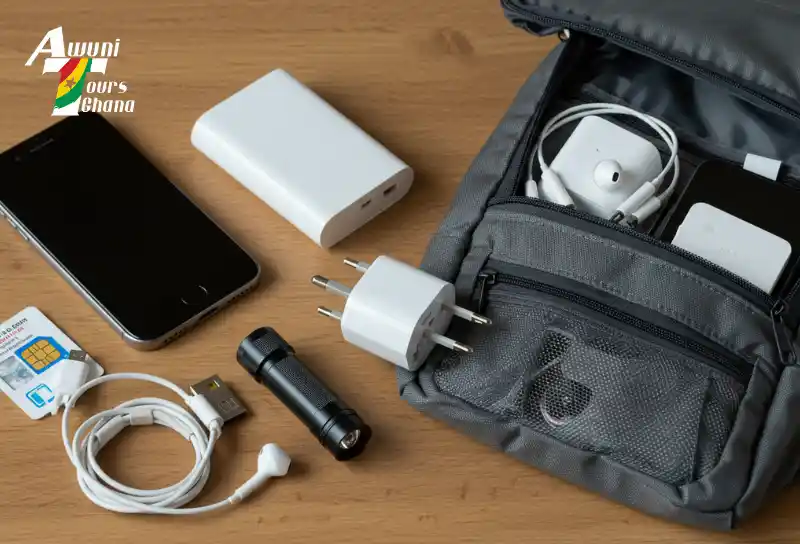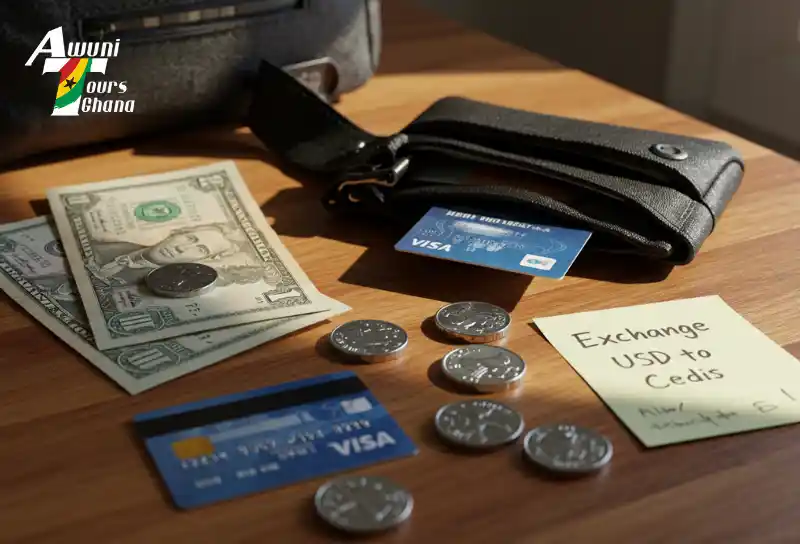Ghana Packing List: What to Pack for a Trip to Ghana (2025 Checklist)
So, you’re getting ready for a trip to Ghana, but you don’t know exactly what to pack. Smart packing is important for this trip because the weather, culture, and travel rules are different from what many travelers are used to.
To make your trip wonderful, we have created this Ghana packing list to help you get fully prepared. It covers everything from entry requirements for Ghana to clothing, health items, and finances, so you can’t forget anything.
You can use this easy travel to Ghana checklist, whether it’s your first visit or you’ve been before; it’s made to help every traveler pack with confidence.
Ghana Packing List: Are You Bringing the Right Essentials?
Before you fly to Ghana, Africa, make sure you pack the right things. This list covers everything you need to bring for a smooth and comfortable trip.
Important Travel Documents
Before you go on any trip, you must have the right travel documents. These papers help you enter the country and avoid any delays or problems.

- Passport: Your passport must be valid for at least 6 more months from your travel date. This is needed for all Ghana trips for entering and identification.
- Visa: You’ll need a visa to enter the country unless you’re from a visa-free nation. Get this in advance from a Ghanaian embassy or apply online if your country allows it.
- Yellow Fever Vaccination Certificate: One of the main requirements for visiting Ghana is proof of yellow fever vaccination. You have to show this document at the airport to enter the country.
- Travel Insurance: Make sure to get travel insurance. It helps you pay for medical expenses or lost items. It’s like a precaution for you if anything goes wrong during your trip.
- Photocopies of All Documents: Make extra copies of your passport, visa, and insurance. Keep them in a separate bag or online in case you lose the originals.
- International Driving Permit: If you want to rent a car to travel to Ghana from the USA, you’ll need this permit along with your regular license.
Clothing & Shoes
The weather in Ghana is usually hot and humid, so pack light and breathable clothes. Also it is a dusty place, so white clothing is not recommended.

Lightweight Clothing
- Breathable Clothes: Ghana is hot, so wear light clothes that allow air to pass through, like cotton or linen.
- T-Shirts and Tops: These are great for staying cool during the day. Bring a few in light colors, which reflect heat better than dark ones.
- Lightweight Pants or Shorts: Loose-fitting bottoms help you stay cool and protect your legs from mosquitoes and sunburn.
- Dresses: Comfortable dresses made from soft materials are great for women. They keep you cool and are easy to wear on hot days.
- A Light Jacket or Sweater: Evenings can be cool in some areas, such as Aburi, Kumasi, or the Volta Region. You might also need it in cold buses and buildings with air conditioning.
Cultural Considerations
- In villages and churches, people dress more conservatively. Wear longer skirts or pants and cover your shoulders out of respect.
- A Scarf or shawl is useful for covering up quickly when needed, especially if you visit a mosque or traditional gathering.
For Rainy Season (April to October)
- Small Umbrella: Rain can come suddenly, especially in the rainy season. A small umbrella will keep you dry without taking up much space.
- Waterproof Jacket: A thin rain jacket protects you from rain without making you too hot. Choose one that folds up easily in your bag.
- Waterproof footwear: Roads can get muddy or flooded. Waterproof footwear helps you walk around comfortably in wet conditions.
- Comfortable Walking Shoes: You’ll walk a lot when you plan a trip to Ghana, so bring shoes that are kind to your feet.
- Flip-Flops: Easy to wear at the beach, in the shower, or when relaxing. They’re light and don’t take up much space.
Health & Hygiene
While travelling, it’s natural to think, Is it safe in Ghana. Well, it is one of the safest countries in Africa, but you should be prepared for any health emergency. These items will help protect you from bugs, the sun, and common travel issues.

- Prescription Medications: Bring enough medicine for your whole trip, in original packaging. Also carry a doctor’s prescription if needed.
- Antimalarial Medication: Malaria is common in Ghana. Talk to your doctor before the trip about pills to prevent it.
- Insect Repellent: Mosquitoes can carry diseases like malaria. Use repellent with DEET or picaridin to keep them away.
- Sunscreen: Ghana has strong sun, so use sunscreen (SPF 30 or higher) to avoid sunburn, especially during outdoor trips.
- Hand Sanitizer and Antibacterial Wipes: Clean your hands when there’s no water or soap available, especially before eating.
- Oral Rehydration Salts: These packets help you stay hydrated if you get sick or have diarrhea. Just mix with clean water.
- Basic First-Aid Kit: Include items like band-aids, painkillers, allergy pills, and antiseptic. You might not find what you need locally.
- Toiletries: Bring your daily hygiene items like toothbrush, toothpaste, deodorant, soap, and shampoo. Travel sizes are best.
- Tissues or Toilet Paper: Public toilets often don’t have paper. Keep tissues or a small roll of toilet paper in your bag.
Electronics & Gadgets
A few smart electronics can make your trip smoother and more enjoyable. These tools help you stay connected, charged, and ready.

- Mobile Phone: Bring an unlocked phone if you want to use a local SIM card for cheaper calls and internet.
- Power Bank: Power cuts are common, especially outside big cities. A charged power bank will keep your phone working.
- Universal Travel Adapter: Ghana uses plugs of type D and G. A universal adapter will make sure your electronics work.
- Flashlight or Headlamp: Useful during power cuts or if you’re walking in areas with poor lighting at night.
- Earphones or Headphones: Handy for listening to music or podcasts during long rides or when relaxing.
Money & Financial Essentials
Handling money is a big part of travel. Learn what cash and cards to bring so you’re always prepared while shopping or paying for services.

- US Dollars: You can exchange US dollars easily in Ghana. Bring clean, newer bills in good condition.
- Ghanaian Cedis: This is the local currency. You can get cedis from ATMs or exchange centers in cities.
- Credit/Debit Card: Cards are accepted in big hotels and stores. Visa works better than Mastercard in most places.
- Money Belt or Hidden Pouch: Keep your cash and important items safe under your clothes, especially in crowded areas.
- Small Coin Purse: Local markets and small shops deal in cash. A small purse helps you carry coins and small bills.
Some Useful Extra Items
- Reusable Water Bottle: It’s hot in Ghana, so drink lots of water. A reusable bottle saves money and reduces plastic waste.
- Travel Towel: Pack 2 towels, which are useful if your hotel doesn’t provide one and can be used for beach trips and hikes.
- Daypack or Small Backpack: Carry your essentials like water, sunscreen, and camera on day trips or walking tours.
- Ziplock Bags: Protect your electronics or keep wet clothes separate. These are super handy for organization.
- Snacks or Energy Bars: Great for long bus rides, hikes, or when food options are limited.
- Guidebook or Offline Map App: The Internet may not always work. Use a guidebook or apps like Maps.me that work without Wi-Fi.
- Notebook and Pen: Write down directions, phone numbers, or journal your experience. It’s a simple but useful tool.
Conclusion
When you plan a trip to Ghana, it’s important to prepare well. Use this Ghana packing list to stay organized. Always double-check the entry requirements for Ghana, especially if you’re traveling during a busy season or with a group.
Whether you travel to Ghana from the USA, Europe, or elsewhere, Ghana’s beauty, history, and friendly people make it an unforgettable destination. Follow this travel to Ghana checklist and enjoy your adventure with confidence.
FAQs
Do you need a passport to go to Ghana?
Yes, a passport is required to enter Ghana. It must be valid for at least six months from your travel date, and most travelers also need a visa before arrival.
What clothes to wear in Ghana?
Light, breathable clothing is best because of the hot and humid weather. Choose modest outfits, especially when visiting villages, religious sites, or local communities.
Is it safe in Ghana for travelers?
Ghana is one of the safer countries in West Africa, with friendly locals and a welcoming culture. Like anywhere, stay alert in busy areas and follow local advice for a smooth trip.
What are the entry requirements for Ghana?
You’ll need a valid passport, a visa, and proof of yellow fever vaccination. Make sure to check the latest Ghana travel advice before flying, especially if traveling from the USA.
What’s the best time to plan a trip to Ghana?
The dry season (November to March) is the best time to visit, with sunny weather and fewer rain interruptions. It’s great for sightseeing, festivals, and outdoor trips.
Can I fly to Ghana from the USA?
Yes, there are direct and connecting flights from major U.S. cities to Accra, Ghana. It’s easy to fly to Ghana, Africa, with regular airlines.




